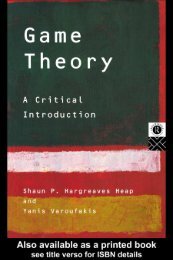handbook-executive-leadership-of-research-development-pdf-v10
handbook-executive-leadership-of-research-development-pdf-v10
handbook-executive-leadership-of-research-development-pdf-v10
Create successful ePaper yourself
Turn your PDF publications into a flip-book with our unique Google optimized e-Paper software.
concentrations <strong>of</strong> <strong>research</strong> activity. The benefits include setting the scene for thelonger-term change to its character and the public perception <strong>of</strong> its role andstanding.This adds to the impact in locations where governance bodies and local stakeholdersare looking to the university to make a significant contribution to the regionaleconomy and infrastructure. Increasing the quality and depth <strong>of</strong> <strong>research</strong> activityalso plays a significant part in attracting talented students into peak area teachingprograms, which in turn creates a pipeline <strong>of</strong> students for postgraduate <strong>research</strong>programs and potential involvement as early career <strong>research</strong>ers.There are direct and indirect benefits for students from their engagement with<strong>research</strong> activity. While there is a distinct lack <strong>of</strong> convincing evidence to support theview that being an active <strong>research</strong>er enhances the quality <strong>of</strong> classroom teaching,there remains a compelling case for an undergraduate curriculum infused withthe <strong>research</strong> orientation <strong>of</strong> the university. The opposite is certainly a poor optionfor universities aspiring to higher standing: undergraduate learning divorced fromthe institutional focus on <strong>research</strong> is effectively limited to a training experience.Successful <strong>research</strong> oriented universities are conscious <strong>of</strong> providing opportunities forthe <strong>development</strong> <strong>of</strong> generic graduate skills through first hand experience <strong>of</strong> <strong>research</strong>activity, including an understanding that knowledge is provisional, contestable andchanging.The benefits for <strong>research</strong>ers involved in connecting the <strong>research</strong> culture toundergraduate education are <strong>of</strong>ten overlooked. Career benefits from the positivecycle should not be underestimated, especially for early career <strong>research</strong>ers. Asidefrom opening up new networks and creating career opportunities, teachers whointroduce <strong>research</strong> activities into assignments generally rate more highly for theirteaching. Active <strong>research</strong>ers who happily teach undergraduates point to the value <strong>of</strong>gaining clarity in their <strong>research</strong> methods, a deeper understanding <strong>of</strong> their subjects,and new insights and connections as a result <strong>of</strong> their interaction with students. Thereis some evidence, reinforced by our own observations that postgraduate studentsand early career <strong>research</strong>ers who teach and <strong>research</strong> show greater improvementin their <strong>research</strong> skills than those who focus exclusively on <strong>research</strong>. 25 Teachingundergraduate students tests the <strong>research</strong>er’s competence, clarifies questions, andsharpens their understanding <strong>of</strong> <strong>research</strong> methods.88 A <strong>handbook</strong> for <strong>executive</strong> <strong>leadership</strong> <strong>of</strong> <strong>research</strong> <strong>development</strong>



